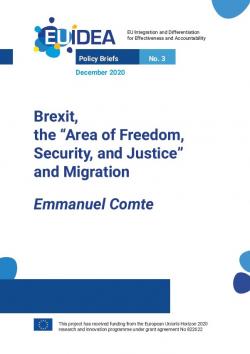Brexit, the "Area of Freedom, Security, and Justice" and Migration
This policy brief focuses on EU–UK negotiations on the movements of third-country nationals. It presents the formation of preferences of both sides and creates a map of existing external differentiation in this area, which supplies models for the future EU–UK relationship. Current negotiating positions show the continuation of previous trends and the potential for close cooperation. This policy brief details two scenarios of cooperation. Close cooperation would continue the current willingness to cooperate and minimise policy changes after the transition period. Loose cooperation could stem from the collapse of trade talks, breaking confidence between the two sides and resulting in a suboptimal scenario for each of them. No scenario, however, is likely to result in significantly lower effectiveness or cohesion in the EU. The UK will always be worse off in comparison to EU membership – particularly under loose cooperation.
-
Details
Rome, IAI, December 2020, 11 p. -
In:
-
Issue
Policy Brief 3
Executive summary
Introduction
1. Object and background of EU and UK negotiations
2. Existing models of external differentiation for cooperation on the movements of third-country nationals
3. Current positions in the EU–UK negotiations
4. Close cooperation scenario vs. loose cooperation scenario, and their likelihood
5. Implications of those scenarios for policy effectiveness and EU cohesion
References



